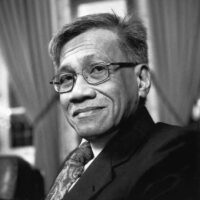
Professor Walden Bello
International Adjunct Professor of Sociology
State University of New York at Binghamton
Professor Walden Bello is concurrently the International Adjunct Professor of Sociology at the State University of New York at Binghamton, Senior Visiting Research Fellow at the Center for Southeast Asian Studies at Kyoto University, and Co-Chairperson of the Bangkok-based research and advocacy institute Focus on the Global South.
He has written regularly about the issue of deglobalization and has emerged as one of the leading critics of the current model of economic globalization and the international case against corporate-driven globalization.
He is the author or co-author of 25 books, including Counterrevolution: The Global Rise of the Far Right (Fernwood, 2019), Paper Dragons: China and the Next Crash (Bloomsbury/Zed, 2019), Food Wars (Verso, 2009), Capitalism’s Last Stand? (Zed, 2013), Dragons in Distress: Asia’s Miracle Economies in Crisis (Penguin, 1990), and Development Debacle: The World Bank in the Philippines (Institute for Food and Development Policy, 1982).
Bello received his BA from the Ateneo de Manila University in 1966 and his PhD in Sociology from Princeton University in 1975.
He received the Right Livelihood Award (also known as the Alternative Nobel Prize) in Stockholm in 2003 for his work showing the negative impact of corporate-driven globalization. He was also named Outstanding Public Scholar by the International Studies Association in San Francisco in 2008. He has honorary doctorates from Panteion University in Athens (2006) and Murdoch University in Perth (2012).

Professor Edward Ashbee
Professor in the Department of International Economics, Government and Business
Copenhagen Business School
Professor Edward Ashbee is Professor in the Department of International Economics, Government and Business at Copenhagen Business School. His books include Deglobalization (Agenda Publishing, 2024), Countering China: US Responses to the Belt and Road Initiative (Lynne Rienner Publishers, 2023), and US Politics Today (Manchester University Press, 4th edition, 2019). He was recently appointed to be the Danish Head of the Educational Programme for Public Management and Social Development.
In his most recent book Deglobalization, published in 2024, Ashbee examines the globalizing processes of the past thirty years and considers the extent to which there has been “deglobalization” or “slowbalization” and the reasons for these apparent shifts.
The book looks at the original promise held out by globalizing trends which became fully evident at the same time as the dot.com economy became part of everyday life. The book then charts the backlash against “globalism” and the ways in which it became pronounced across much of Europe, North America, and Asia. And it asks how far has that backlash, together with the 2008 financial crisis, the Covid-19 pandemic, and the rise of “techno-nationalism” led to a stalling or even reversal in globalizing processes.
The analysis disaggregates the different trends that collectively constitute “globalization” and surveys competing perspectives on globalization and reviews the arguments of those who argue that the concept is either myth or hyperbole.